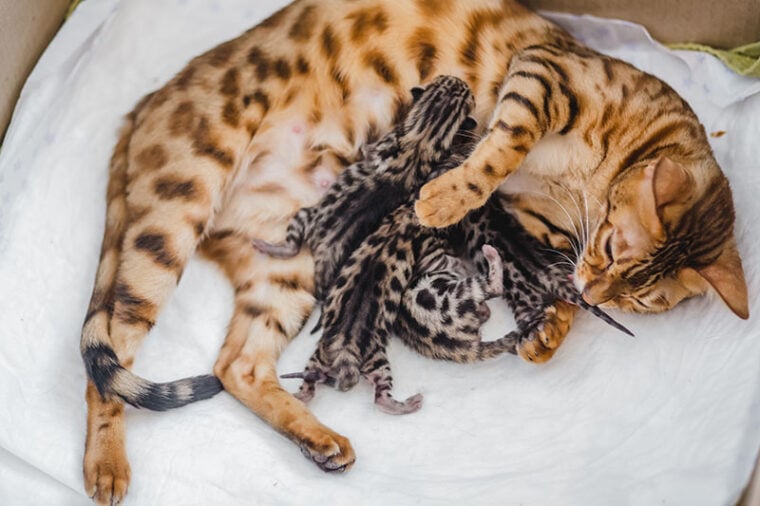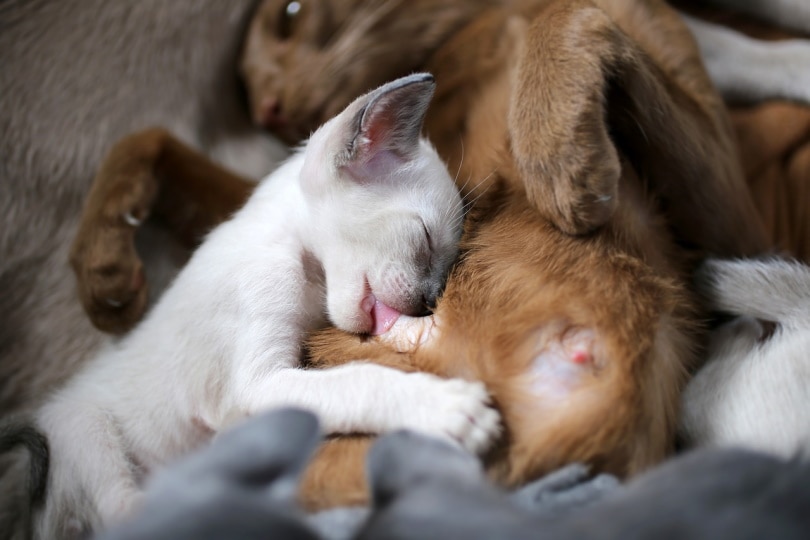
Cats purr for a multitude of reasons. Usually, we think of cats purring when they are happy and content, but sometimes owners of female cats who’ve had kittens will comment that their cats purr during labor and wonder if it’s normal for them to do so. It’s normal for queens (female cats) to purr during labor, particularly at the beginning stages.
Why Do Cats Purr During Labor?
Cats often purr when in pain or to relax in stressful situations. The beginning stages of labor can be stressful for female cats, but they instinctively know they need to bed down (or “nest”) and relax in preparation for giving birth.
This loud, rhythmic purring can also help to soothe them during the process and will often be accompanied by other signs of early labor, including:

Mother cats may also purr during labor to prepare for their kittens’ arrival. Kittens are born blind, deaf, and at the complete mercy of the world, and they are 100% reliant on their mother to keep them alive. So, queens will purr to communicate with their kittens (even before birth) and encourage them to locate them and root for milk.
Because of the vibrations purring produces, the kittens may be able to use this to navigate to their mothers and keep them close, despite not being able to see or hear them. Cats also purr to communicate with their kittens, encouraging them to feed.
Does Purring Relieve Pain?
Purring in domestic cats has its own special frequency, between 25 and 50Hz. Research has shown that these two frequencies in particular (25 and 50 Hz) are exact and purposeful, as they match the frequency used in human medicine used to promote bone and tissue healing and new growth.
This pain-relieving and healing purring may be why mother cats begin to purr (and continue throughout) in labor, as they know it can help heal any damage the delivery of the kittens may cause to their bodies.
Why Do Mother Cats Purr When Nursing?
Mother cats purr while nursing because her kittens need to stay with her to survive, and they are blind and deaf, so they cannot hear or see her. The low vibrations of her purr both soothe them and draw them to her so she can feed them, and purring also releases endorphins which can help the mother relax.

Should I Stay With My Cat As She Gives Birth?
Some cats will want to give birth entirely alone, and some will jump on your chest to let you know it’s happening! But, mostly, cats will probably want you around but do not want you touching them, bothering them, or fussing with them when they’re giving birth.
Make sure your cat has a quiet, calm space to give birth in, which is secure and cozy, like a cardboard box with the roof cut off lined with towels or blankets. This will help to keep her comfortable and feel secure. Also, try to keep an eye on her so you can look out for any problems she may be facing and be ready to help.
How Can I Tell If My Cat is Having Trouble Giving Birth?
Dystocia (or difficult labor) is when an animal has trouble giving birth or has stopped giving birth altogether. It can be tricky to tell when a cat is experiencing dystocia because the process is different from human labor and is usually a lot less dramatic.
Typically, cats will give birth to each kitten one after the other within a specific time frame (16 hours usually from start to finish), and some cats may even pause their labor to tend to the kittens who are already born. A long labor process may mean that veterinary intervention is needed; having your veterinarian’s number on hand is helpful in these situations.
Final Thoughts
Cats purr during labor for a few reasons, mostly settling down and preparing for the challenge ahead. It’s normal for cats to purr or not purr when giving birth, but owners of pregnant cats should be aware of the signs that their cat is struggling to give birth and when medical intervention is necessary.
See Also:
- Why Is My Cat Purring So Loud? 6 Vet-Reviewed Reasons
- 8 Best Cat Foods for Nursing Mother Cats in Canada
Featured Image Credit: LElik83, Shutterstock







